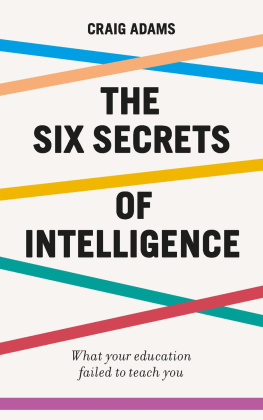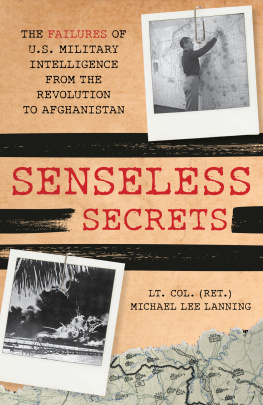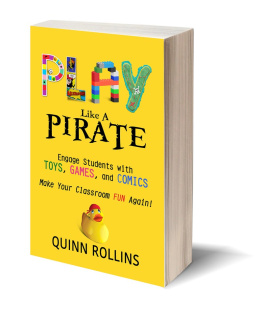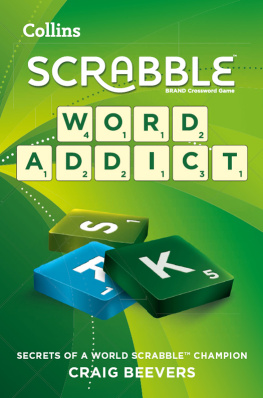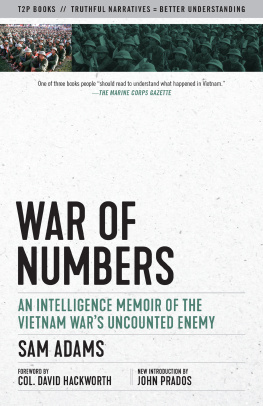(Teacher) Craig Adams - The six secrets of intelligence : what your education failed to teach you
Here you can read online (Teacher) Craig Adams - The six secrets of intelligence : what your education failed to teach you full text of the book (entire story) in english for free. Download pdf and epub, get meaning, cover and reviews about this ebook. year: 2019, genre: Religion. Description of the work, (preface) as well as reviews are available. Best literature library LitArk.com created for fans of good reading and offers a wide selection of genres:
Romance novel
Science fiction
Adventure
Detective
Science
History
Home and family
Prose
Art
Politics
Computer
Non-fiction
Religion
Business
Children
Humor
Choose a favorite category and find really read worthwhile books. Enjoy immersion in the world of imagination, feel the emotions of the characters or learn something new for yourself, make an fascinating discovery.
- Book:The six secrets of intelligence : what your education failed to teach you
- Author:
- Genre:
- Year:2019
- Rating:5 / 5
- Favourites:Add to favourites
- Your mark:
- 100
- 1
- 2
- 3
- 4
- 5
The six secrets of intelligence : what your education failed to teach you: summary, description and annotation
We offer to read an annotation, description, summary or preface (depends on what the author of the book "The six secrets of intelligence : what your education failed to teach you" wrote himself). If you haven't found the necessary information about the book — write in the comments, we will try to find it.
The six secrets of intelligence : what your education failed to teach you — read online for free the complete book (whole text) full work
Below is the text of the book, divided by pages. System saving the place of the last page read, allows you to conveniently read the book "The six secrets of intelligence : what your education failed to teach you" online for free, without having to search again every time where you left off. Put a bookmark, and you can go to the page where you finished reading at any time.
Font size:
Interval:
Bookmark:
Having emerged from the dark hardship of another day spent deep in the belly of the earth, Mr Wu sits in his living room, illuminated by a single bare light bulb. In the two-room brick house he built with his own hands, there is no sign of anything that you or I would call a luxury. Outside, there is no family car, and there never has been. Mr Wu has never seen the ocean.
And yet, after twenty years of mining coal, neither the intensity of his work nor the depth of his sacrifice has gone unrewarded. Mr Wu and his wife, who toils and saves with no less dedication, have something thats very special indeed; something thats worth more to them than a car or a holiday. What they have is a daughter whos educated.
The young Miss Wu will graduate from university soon. Shes growing up in an increasingly connected world, and to find her place in it shes studying logistics: the science of distribution. Twenty years of her parents effort and thousands of hours of her own study have led to one moment: the moment when her schooling must transform itself into a job.
Her parents have invested in the best education they could afford for their only daughter because as they grow older, they will both depend on her to take care of them. The Wu family cant afford to think about it any other way. For a miners daughter in rural China in the early 21st century, education is about getting a job.
Deep inside the earth on the other side of the world, education is also going on. Through a dark tunnel, a tube carriage lurches from side to side, its passengers swaying to the rhythm of its journey. Ive been lucky enough to find a seat, and so has the man sitting opposite me. Im watching him with interest, and Im not the only one.
I doubt hes doing it on purpose; in fact, he seems to be completely absorbed in his own world, but eyes are turning towards him nonetheless. My fellow watchers, I think, are sharing the emotions that Im feeling a mixture of admiration and guilt because the man is doing something that most of us feel we should be doing more of: reading.
Its not just any book hes reading, though. This book is huge. Its thick. Its one of those books where the spine is so wide that your first thought is not to wonder whether it might be interesting or entertaining, but to calculate how many hours of your life you would have to sacrifice to absorb it. I subtly tilt my head to read the title on the spine: JAMES JOYCE ULYSSES.
At eight oclock on a Tuesday night, this sharp-suited reader with bags under his eyes and a big leather satchel at his feet is very obviously on his way home from a long day at the office. I imagine him concentrating through endless meetings, frowning at huge spreadsheets or poring over dense legal documents. Yet despite his busy day, and in contrast to all the other things he could be doing, hes giving his time, energy and concentration to a behemoth of a book thats famously difficult to read. Why?
For the man on the train, this education isnt about making money. The man on the train doesnt have his back pressed up against the wall of economic necessity. This mind-sharpening is a different sort of thing to the education of a coal miners daughter and it seems to be meandering its way towards a destination thats difficult to put ones finger on. But wherever its heading, its the man whos in charge of his own journey just as we are.
In the Western world in the early decades of the 21st century, most of us are like the guy on the train. We arrive at school, take our seat and wait for the ride to begin; but once our schooldays are over, we get to walk in any educational direction we choose and its completely up to us how we do it. Education, like life, is a lottery, and in stark contrast to those whose circumstances deny them both freedom and opportunity the problem most of us face today isnt a lack of choice; its having too much.
So what do you choose? Do you visit the library or the bookshop, and if so, which books do you pick out from the shelves? Do you download apps that promise to expand your vocabulary, polish your grammar or train your brain? Do you watch lectures online, listen to podcasts, or feed your mind with a diet of museums, galleries and exhibitions?
Most of us go in for a bit of everything. School is a base coat of traditional subjects that we embellish with a combination of whats interesting, well-advertised and fashionable; but we can get so caught up in whatever is currently holding our interest that its easy to lose sight of what we really want in exchange for all that time, money and effort. What change are we hoping to see?
When were not educating ourselves to get a qualification that will help us to get a job or start a career, its my contention that were not entirely sure what we want, and that we find it hard to say exactly how our efforts to educate ourselves add up to a sharper mind. Were impressed and entertained by knowledge about everything from the history of the world to the workings of the universe. Were fascinated by all sorts of facts but what we really want is something more mysterious and elusive. There is something that lives between the boundaries of any particular area of knowledge: something thats deeper than the triviality of trivia. What were after is the thing we call intelligence.
One way to understand what we want is to follow the advice of Sigmund Freud and examine our fantasies. The collective intellectual dream that we see reflected back at us in the form of the characters we admire from films, on television and in books is not that of an expert in one tiny factual area, nor a master of general knowledge. Our fictional fantasies are of the flexible minds of insightful detectives and mercurial political masterminds. What were after is the kind of mental agility that makes observations no matter the situation, and has something to say no matter the topic of conversation. We dont often fantasise about winning the local pub quiz. We want to be the person in the room who sees how everything fits together.
But what exactly is this all-round ability that we sometimes call general intelligence? Why is it that some people always have something to say and solutions to offer in any business meeting, political debate, family argument or philosophical discussion? How do they do it? You cant memorise a pile of facts that works in every situation: that would be impossible. Intelligence is mysterious, but understanding it starts with a simple idea: intelligence isnt what you know; its how you think.
Standing at this crossroads of the mind, with our backs turned away from the limitations of facts, you might think that wed be set on the right path headed in the general direction of intelligence but theres a problem. We describe intelligent people in different ways: perceptive, subtle, critical, logical, rational, analytical or creative but what exactly do these words mean and how are they supposed to help us? We try to point out the fact that some people can do things with their brains that others cant by saying things like: shes got an analytical mind or whats important is critical thinking but how can being told to be more analytical or more critical actually change the way we think? A collection of vague synonyms that only describes the fact that some people notice what others dont does not explain it. If we cant say much about the thinking that defines intelligent people, how can we learn to do what they do?
This is the nature of intelligence and the problem with education itself. Its easy to make grand promises and bombard the credulous with clever-sounding words that appear to explain something so elusive, but its incredibly difficult to say something fundamental and useful about what goes on in our heads. Its difficult to say something practical that illuminates the everyday thinking of our everyday lives. In the modern age, the vague promise of a true education of the general mind is everywhere, but the concrete ideas that transform the way we see the world are not.
Font size:
Interval:
Bookmark:
Similar books «The six secrets of intelligence : what your education failed to teach you»
Look at similar books to The six secrets of intelligence : what your education failed to teach you. We have selected literature similar in name and meaning in the hope of providing readers with more options to find new, interesting, not yet read works.
Discussion, reviews of the book The six secrets of intelligence : what your education failed to teach you and just readers' own opinions. Leave your comments, write what you think about the work, its meaning or the main characters. Specify what exactly you liked and what you didn't like, and why you think so.

